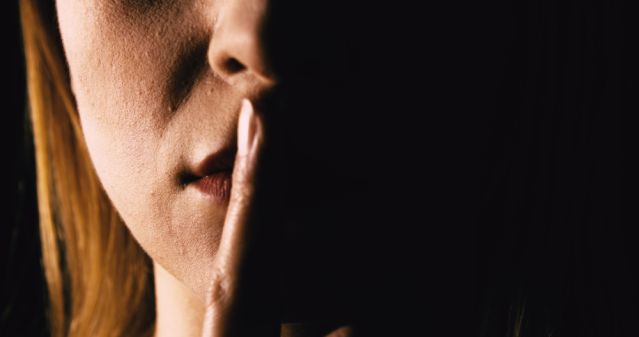Authenticity
Interrogating the Cost of Silence and Finding My Voice
Personal Perspective: How speaking the unspeakable can rescue us from isolation.
Posted October 27, 2023 Reviewed by Tyler Woods

My friend, a former broadcast journalist, recently sent me an archived piece she produced for CBS's 60 Minutes in 1985. It's a 17-minute segment called "The Burks Have AIDS," about a young couple and their infant in Pennsylvania—the first reported American family to have the virus. A 40-ish Diane Sawyer interviews Patrick Burk, 27, a person with hemophilia, who had contracted HIV from blood-clotting products and unwittingly infected his wife, Lauren, 24, who then passed the virus to their baby, Dwight.
With unwavering directness, Sawyer also interviews doctors and scientists from the CDC and the NIH, pressing them to acknowledge the slow governmental response to the virus and the desperate need for research funding and public education to dispel public myths about how HIV spreads and who might be at risk for the disease. Until then, moral condemnation of the populations most impacted by AIDS—gay men and IV drug users—kept conservative leaders and their supporters silent about the escalating epidemic. "In the name of morality, we are letting people die, and we're killing them," Matihlde Krim, founding chair of the American Foundation for AIDS Research, declares to Sawyer.
In an accompanying email, my friend tells me that the news magazine at first resisted the production of this story. "Sawyer, though, leapt at the chance," she says. "But not without obstacles." Just finding a camera crew was difficult because of fear that any exposure to the family, or even touching the celluloid film used at the time, could lead to infection.
Her words and the segment stick with me in that up-at-three-in-the-morning-thinking-about-it kind of way. In the almost 30 years since the piece aired, advances in research, education, prevention tools and strategies, and effective treatments that let people with HIV live healthy lives have progressed the narrative, and these kinds of fears don't dominate the 2023 headlines. But for me, they are painful echoes of the story that indelibly marred my adolescence and adulthood and has threaded into so many facets of my life.
My father contracted the virus in 1985 from a blood transfusion during open-heart surgery. Though my family lived in Canada, Sawyer's reporting from that year carries grim reminders of the same stigma that pervaded our cultural mindset and conversations about AIDS in the 1980s and '90s. A stigma that prompted my father to keep his HIV status a secret. A secret we all kept until only months before his death in 1995, when he and my mother published a book disclosing his illness and its impacts.
I was 13 when Dad was infected and 23 when he died. For that pivotal developmental decade of my life, HIV and all its unknowns piled on me the most vulnerable of emotions. Confusion: how did Dad's infection mesh with the social messages of victim-blaming and discrimination that were all around me? Terror: what impossible-to-know havoc would this disease wreak on the life I'd known? Grief: because there was no other outcome, when and how would my dad, my ever-present anchor, die? Loneliness: who could I trust to share this burden? Shame: if it has to be a secret, there must be something really bad about it, right? I held it all, and I couldn't talk about any of it.
Even after the secret was no longer necessary, the silence was something I did not let go easily. For almost 20 more years, I carried it close, quarantining those painful feelings that tied on to all of its complicated pieces. It took me a long time to understand that I was allowed to change the rules I'd had to follow for so long.
In 2013, I enrolled in an MFA in creative writing, and it was then that I began to unseal the tape wrapped around the experience of my father's illness and death. Of my family's silence. What I discovered underneath launched me into a painful excavation process. I had to approach the word-gathering with what one of my former MFA mentors refers to as "reckless honesty." Since honesty was the antithesis of my learned way of being, this approach took some getting used to and a whole lot of therapy.
It also took me a while to dig beyond the circumstances and figure out the one thing I really wanted to know: What is the cost of silence?

Inside the greater cultural context of my story, that cost isn't tough to see. So much of what happened from the start of the AIDS epidemic has seeped from our collective memory. There's an entire generation that doesn't know anything of the lived experiences that inhabit that period in our history. My story, the Burk family's and so many other families like ours; individual stories and the stories of entire communities ravaged by a virus that never discriminated, despite what loud voices of the era pushed us to believe—none should be shrouded in silence. Doing so only enables the persistence of the stigma that continues to determine public and private responses to people with HIV/AIDS.
Not so easy to reckon with is the personal cost of leaving the particulars of our pain unspoken. In the process of writing and sharing my story, I've met those who've been changed by HIV/AIDS, but also many others who've had to keep silent about their own family secrets of grief, mental illness, health challenges, abuse, and trauma. So many of these stories, though not my own, resonate with the same fears of disclosure. Yet silence around suffering, no matter its nature, breeds isolation. Can we ever truly be ourselves if we are hiding the things that matter most? I couldn't. But I wouldn't have found that answer if I hadn't risked writing into the question. I didn't know that in letting go of the silence, I would release the shame. And, until I gave it to others to read, I didn't know the relief of having someone say, without judgment, "I really see you."




